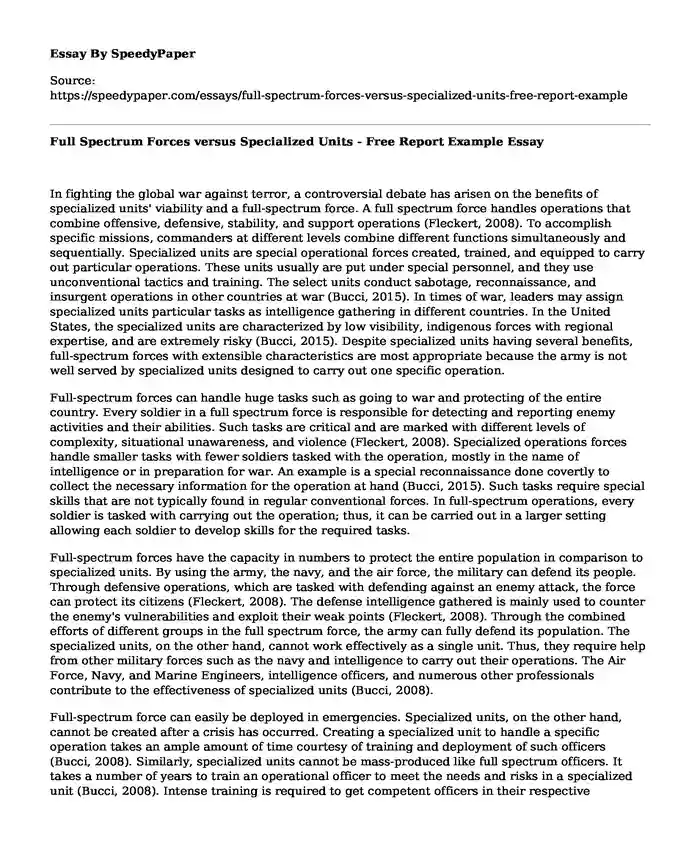In fighting the global war against terror, a controversial debate has arisen on the benefits of specialized units' viability and a full-spectrum force. A full spectrum force handles operations that combine offensive, defensive, stability, and support operations (Fleckert, 2008). To accomplish specific missions, commanders at different levels combine different functions simultaneously and sequentially. Specialized units are special operational forces created, trained, and equipped to carry out particular operations. These units usually are put under special personnel, and they use unconventional tactics and training. The select units conduct sabotage, reconnaissance, and insurgent operations in other countries at war (Bucci, 2015). In times of war, leaders may assign specialized units particular tasks as intelligence gathering in different countries. In the United States, the specialized units are characterized by low visibility, indigenous forces with regional expertise, and are extremely risky (Bucci, 2015). Despite specialized units having several benefits, full-spectrum forces with extensible characteristics are most appropriate because the army is not well served by specialized units designed to carry out one specific operation.
Full-spectrum forces can handle huge tasks such as going to war and protecting of the entire country. Every soldier in a full spectrum force is responsible for detecting and reporting enemy activities and their abilities. Such tasks are critical and are marked with different levels of complexity, situational unawareness, and violence (Fleckert, 2008). Specialized operations forces handle smaller tasks with fewer soldiers tasked with the operation, mostly in the name of intelligence or in preparation for war. An example is a special reconnaissance done covertly to collect the necessary information for the operation at hand (Bucci, 2015). Such tasks require special skills that are not typically found in regular conventional forces. In full-spectrum operations, every soldier is tasked with carrying out the operation; thus, it can be carried out in a larger setting allowing each soldier to develop skills for the required tasks.
Full-spectrum forces have the capacity in numbers to protect the entire population in comparison to specialized units. By using the army, the navy, and the air force, the military can defend its people. Through defensive operations, which are tasked with defending against an enemy attack, the force can protect its citizens (Fleckert, 2008). The defense intelligence gathered is mainly used to counter the enemy's vulnerabilities and exploit their weak points (Fleckert, 2008). Through the combined efforts of different groups in the full spectrum force, the army can fully defend its population. The specialized units, on the other hand, cannot work effectively as a single unit. Thus, they require help from other military forces such as the navy and intelligence to carry out their operations. The Air Force, Navy, and Marine Engineers, intelligence officers, and numerous other professionals contribute to the effectiveness of specialized units (Bucci, 2008).
Full-spectrum force can easily be deployed in emergencies. Specialized units, on the other hand, cannot be created after a crisis has occurred. Creating a specialized unit to handle a specific operation takes an ample amount of time courtesy of training and deployment of such officers (Bucci, 2008). Similarly, specialized units cannot be mass-produced like full spectrum officers. It takes a number of years to train an operational officer to meet the needs and risks in a specialized unit (Bucci, 2008). Intense training is required to get competent officers in their respective specialized units. The numbers in specialized units are also too low to handle different emergencies, making a full-spectrum force more effective.
In my view, a full spectrum force creates a large pool of deployable units, which is based on the skills of the different officers. In a full-spectrum environment, soldiers are quickly deployed, and they operate effectively in both domestic and full-range combat environments. The soldiers offer stability in both domestic settings and combat operations. In Afghanistan, for instance, a full spectrum force was able to create and maintain some stability in the war-torn country. With further support for a full spectrum force, peace will be fully maintained for Afghanistan's citizens. I believe that specialized units should not necessarily replace the full spectrum force; instead, they should work together since specialized units are useful in covering operations, gathering intelligence, and even counterterrorism in neutralizing terrorists. Both groups do an undeniable amount of good in protecting the people, and thus I believe they should work together.
References
Bucci, S. P. (2015). The importance of special operations forces today and going forward. 2015 Index of US Military Strength.
Felckert, A. (2008, January). Does the army need a full-spectrum force or specialized units? Background and issues for congress. LIBRARY OF CONGRESS WASHINGTON DC CONGRESSIONAL RESEARCH SERVICE.
Cite this page
Full Spectrum Forces versus Specialized Units - Free Report Example. (2024, Jan 04). Retrieved from https://speedypaper.com/essays/full-spectrum-forces-versus-specialized-units-free-report-example
Request Removal
If you are the original author of this essay and no longer wish to have it published on the SpeedyPaper website, please click below to request its removal:
- Essay Example Containing Political Psychology Questions
- Essay Sample on the Rise of Consumer Society: Department Stores
- Essay Sample on Mount Auburn Cemetery Journal
- Free Essay Example - Signs of Abuse
- Protecting the US: The Role of DHS - Essay Sample
- Paper Example. Social Disorganization Theory and Assault
- Love Is More Powerful Than Hate: Essay Sample for Inspiration
Popular categories





